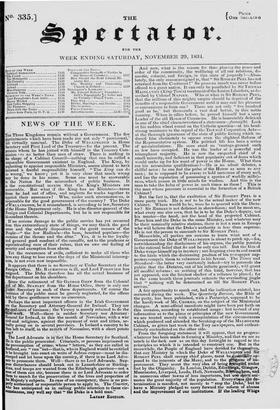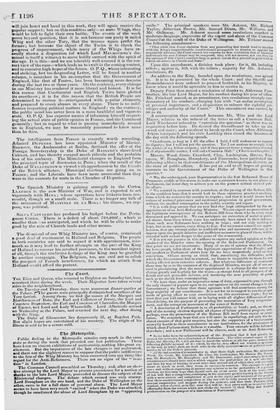NEWS OF THE WEEK.
las Three Kingdoms remain without a Government. The few appointments which have been made are not only " provisional,"
but virtually nominal. The Duke of WELLINGTON is Home
Secretary and First Lord of the Treasury—fur the present. The persons whom he has joined with himself in the Treasury Com- miSsion rro no better than men of straw. There is nothing in the shape of a Cabinet Council—nothing that can be called a responsible Government existent in England. The King, by neglecting to appoint responsible Ministers, seems almost to have
incurred a fearful responsibility himself. "The King can do no wrong," we know ; yet it is very clear that much wrong may be done in his name. Some one must be answerable to the Nation for the misconduct of public business. It is the constitutional maxim that the King's Ministers are answerable. But what if the King has no Ministers—turns those be had out of office, and neglects for weeks together to appoint their successors? Who, under such circumstances, is responsible for the good government of the country? The Duke of WessisruTox, be it remembered, is according to law, Secretary of the Home Department only. He is also director-general of the Foreign and Colonial Departments, but he is not responsible for his conduct therein.
If no serious damage to the public service has yet occurred from this extraordinary state of things, we may thank the good sense and the orderly disposition of the great masses of the People—" the low Radicals—the base, besotted populace—the enemies of the throne and the altar." Yes, it is to the loyalty and general good conduct of the canaille, not to the prudence or superintending care of their rulers, that we owe our feeling of security and exemption from alarm.
Yet the occurrence of evils, sufficient to make all those who bare any thing to lose curse the days of the Ministerial interreg- num, is not even now impossible.
It appears that there is no Secretary or Under Secretary at the Foreign Office. MT. BACKHOUSE is ill, and Lord FORDWICH has resigned. The Duke therefore has all the actual business of that department on his shoulders.
Since the retirement of Sir GEORGE GREY from the Colonial and of Mr. STANLEY from the Home Office, there is only one Ades Secretary in each of these departments. Of course the business of the public must be grossly neglected, for the offices held by these gentlemen were no sinecures.
Perhaps the most important officers in the Irish Government are the Secretary and Attorney-General for Ireland. They are
;01sinen of business; the Viceroy is merely retained to do the oirweets. Well—there is neither Secretary nor Attorney' General for Irelaed, in this the month of November, with a war evil and religious, against the payment of rent and tithes, ac- tually going on in several_provinces. Is Ireland a country to be thus left to itself, in the month of November, with a short potato crop?
The Lord Advocate is iiiIact the Home Secretary for Scotland.' Ile is the public prosecutor.'..' Criminals, or persons imprisoned on the presumption of crime, whose" letters," as they are called in Scotland, are " run 'Out—that is, who in England would be entitled to be brought into court on writs of habeas corpus—must be dis- charged and let loose upon the country, if there is no Lord Advo- fate to prosecute them. Well—there is no Lord Advocate. Sup- Pose disturbances should break out in Lanarkshire or Stirling- Aire, and troops are wanted from the Edinburgh garrison—not a roan of them can stir, because there is no Lord Advocate to order them to march for the preservation of the lives and properties of his Majesty's subjects. In ease of an emergency, there is no pro- perly authorized or responsible person to apply to. The Courier, 1010 has anticipated us in calling public attention to these cir- cumstances, may well say that " the Duke is a bold man." And now, what is the reason for thus placing the peace and order of the community, the wellbeing of all our relations, do- mestic, colonial, and foreign, in this state of jeopardy ?—Abso- lutely, the only reason assigned is, that " Sir ROBERT PEEL has not returned from the Continent !" So gross an insult was never before offered to a great nation. It can only be paralleled by Sit*THONIAS MA.ITLAND'S (King Tones) treatment of the Ionian Islanders, as de- scribed by Colonel NAPIER. Who or what is Sir R013ERT PEEL, that the millions of this mighty empire should be deprived of the benefits of a responsible Government until it may suit his pleasure or convenience to form one? There are not only " five hundred good as he," but thousands a vast deal better, in this noble country. When in office before, lie proved himself but a sorry Leader of the old House of Commons. He is lamentably deficient in one of the chief characteristics of a statesman—foresight. Look at his sudden wheel round on the Catholic question—at his head- strong resistance to the repeal of the Test and Corporation Acts— at the thorough ignorance of the state of public feeling which in- duced him obstinately to oppose even the slightest Reform of the Representative system. His political life has been a series of miscalculations. He once stood on 'vantage-ground such as few have occupied. He was the leader of a powerful and triumphant majority. He is now the suspected chief of a small minority, and deficient in that popularity out of doors which would make up for his want of power in the House. What then are his miraculous qualifications?—He is an adroit debater, a skilful actor; he can feel the pulse of the House as soon as any man ; he is supposed to be averse to bold measures of every sort, and has the reputation of possessing a species of worldly selfish- ness, which passes in little minds for wisdom. And this is the man to take the helm of power in such times as these ! This is the man whose presence is essential to the formation of a British Cabinet !
But the fact is, that the exaltation of Sir ROBERT PEEL is a mere party trick. He is not to be the actual maker of the new Cabinet. Where would he be, were he to quarrel with the Dicta- tor? Sir ROBERT is not deficient in shrewdness; and he must see, what every one else sees, that he is to be the Duke's deputy, not his master—the hand, not the head of the projected Cabinet. Place him and the Duke in the same Ministry, and whatever may be their nominally relative stations, there is not a man in Europe who will believe that the Duke's authority is less than supreme. He is not the person to succumb to Sir RonsieT PEEL. Meanwhile, all parties are anxious to learn what sort of a Government the Duke of WELLINGTON is about to patch up,—for, notwithstanding the disclaimers of his organs, the public persists in the rational belief that he and he only can tell. But the Gra:id Duke wraps himself up in mystery; not deigning even to nod assent to the hints which the distressing position of his newspaper sup. porters compels them to volunteer in his favour. The Times and Standard—the latter very cautiously indeed—try to persuade the public that the Dictator, out of his infinite generosity, will grant all needful reforms: on nothing of this kind, however, that has yet appeared, can the faintest shadow of a reliance be placed; fur in the same breath these journals reiterate the everlasting jingle that " nothing will be determined on till Sir ROBERT PEEL arrives."
A fair opportunity to speak out, had the inclination existed, has occurred during the week. The Quarterly Review, the Bible of the party, has been published, with a Postscript, supposed to be the handywork of Mr. CROKER, on the subject of the Ministerial changes. A semi-official manifesto might have been put forth on this occasion, according to established usage: but instead of any information as to the plans or principles of the new Government, we are treated merely with a recapitulation of the circumstances which produced and attended the breaking-up of the MELBOURNE Cabinet, as given last week in the Tory newspapers, and authori- tatively contradicted on the other side. From the foregoing statement it will appear, that no progress whatever has been made in forming a Ministry, andthat we are as much in thedark now as on this day fortnight in regard to the principles on which it is intended to construct one. But in the meanwhile, the People of England have dedided for thfesqlveg, that any Ministry in which the Duke of WELLINC.201‘ and Sir ROBERT PEEL shall occupy chief places, must be ssentlly.op-
posed to the interests of the Many, and to the ss of'im-
provement. They scout the very idea of being pig tinder foot by the Oligarchy. In London, Dublin, Edin Ctih; Glasgow, Manchester, Liverpool, Leeds, Hull, Newcastle, B iagbain, and in numerous other towns of less importance, but ens) skArit'ani- mates the great majority of the population. Everywhere de- termination is manifest, not merely to "stop the Duke," 6ut to' have a Ministry pledged to carry forward the reform of abuses and the improvement of our institutions. If the leading Whigs will join heart and hand in this work, they will again receive the popular support; but on this condition only—as were Whigs, they would be left to fight their own battle. The events of the week prove beyond question, that it is not because one party is called Whig and the other Tory, that the masses again prefer the former; but because the object of the Tories is to check the progress of improvement, while many of the Whigs have re- cently shown a disposition (of which Lord MELBOURNE'S dis- missal is itself a witness) to move boldly onward with the spirit of the age. It is this—and we are tolerably well assured it is the cor- rect view of the case—which leads us to exult in the coming contest, and to conceive high hopes of the future. 0. P. Q., whose interesting and striking, but too desponding Letter, will be found in another column, is mistaken in his assumption that the Government of England, like that of France, has been becoming more despotic during the last two or three years. On the contrary, every change in our Ministry has rendered it more liberal and honest. It is for this reason that Continental and English Tories have plotted its overthrow ; it is for this reason that the British People are determined to restore it—reinvigorated with popular elements, and prepared to crush abuses in every shape. There is no indif- ference respecting political matters in England : on the contrary, the public mind has never been in a more healthful and vigorous state. 0. P. Q. has superior means of informing himself respect- ing the actual state of public opinion in France, and the Continent generally; but in regard to what is passing immediately around us in England, we may be reasonably presumed to know mote than he does.





















